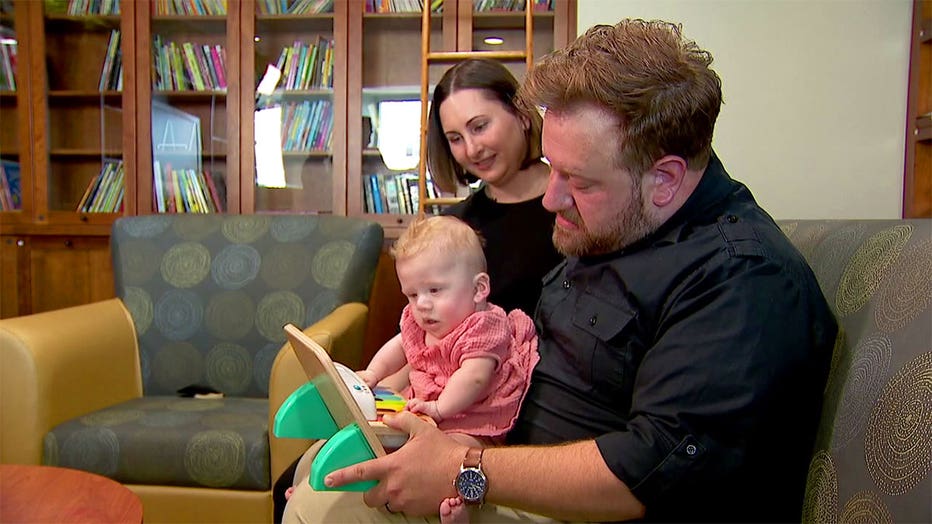Newborn girl survives pregnancy triple threat, called 'one in millions'

Aria's Story: Newborn baby overcomes the odds
After three months in the neonatal intensive care unit at Children?s Minnesota, Aria is home, thriving, and playing with her toy piano?her favorite?and fitting of her name.�Her mother notes that the word aria is a song in an opera and literally translates as ?air? in Italian.� She and Jesse thought it was perfect for a little girl born with a lung mass.
MINNEAPOLIS (FOX 9) - At just seven months old, Aria Stensby is a prized songwriter and doesn’t yet know it.
Sitting on her parents' lap and tapping at a toy piano, she plays a haphazard chorus of notes that make little sense. And yet the fact that she’s playing anything at all is a perfect chorus to a dramatic medical opera that could have ended in tragedy. Call it a song in the key of happiness.
"Yeah, we were very excited," said Sarah Stensby when she and her husband Jesse learned they were pregnant with their first child. Since Sarah was 40 at the time, she waited until she reached eight weeks and opted for a genetic blood test to screen for any abnormalities that could come with pregnancies in older mothers.
"And when we got that back, we found out that she had Turner syndrome," explained Sarah.
Turner Syndrome is a very rare genetic disorder that affects girls. At conception, their bodies develop with a completely missing or partially missing X chromosome. Data from the National Institutes of Health shows it affects about 1% of all pregnancies and typically results in a miscarriage early in the first trimester.
"She wouldn’t be here if we hadn’t done that early screening," said Sarah, acknowledging that the discovery put her in a high-risk category which qualified her for more advanced prenatal care. Among the first steps doctors took was to give her an ultrasound at 16 weeks as opposed to the standard 20-week screening. It was then doctors discovered even more challenges.
"She was a very, very sick little girl," said Dr. Lisa Howley, a cardiologist with Midwest Fetal Care Center, a collaboration between Children’s Minnesota Hospital and Allina Health. Upon reviewing Aria’s ultrasound, Dr. Howley discovered she had a massive growth in her lung that was compressing the heart.

Baby Aria (FOX 9)
"So this is an abnormal tissue that has formed in the space where her lungs should be," explained Howley as she pointed to an advanced MRI image that showed the mass pushing the heart all the way up the chest wall.
But that was only the first life-threatening discovery. The second revealed a defect in the heart itself called a coarctation of the aorta where the main artery coming out of the heart is pinched resulting in reduced blood flow to the body.
And then another complication when Aria was born six weeks early and weighing a little more than three pounds.
"She was prepped for surgery while she was still connected to me and taken for surgery immediately following birth to remove the mass from her lung," said Sarah, still recalling the details of Aria’s birth. Doctors at Children’s Minnesota successfully removed Aria’s lung mass and she spent weeks in the neonatal intensive care unit until she could gain enough weight to undergo the procedure to repair her heart. That too was a success.
"So, having Turner syndrome, your likelihood of that is less than 1%. And then your likelihood of congenital heart disease is right around 1%. And then the likelihood of a lung mass is less than 1%. And yet she had all three of them," explained Howley. "And so that is probably one of the most rare combinations I have seen in my career. I've not seen it before nor since."
It’s part of the reason why Sarah and Jesse are telling Aria’s story. During Sarah’s pregnancy, their medical teams could not find another similar case from which they could build a care plan.
"They never gave us any guarantees. They never gave us any sort of false hope. But they also said it was never a hopeless situation," said Sarah of their care team at Children’s Minnesota who she and her husband praised for their professionalism. "So they just kind of kept our hope and our confidence up and kept things positive."
"It just was really important for us was to have this out there so that anybody that faces anything like this going forward has a case to look to and has, you know, a sense of hope," explained Jesse about how they want Aria’s case to serve as a care template for doctors and parents who may also experience a similar high-risk pregnancy.
"She’s not one in a million, she’s one in many millions," said Sarah about the rarity of Aria’s case.
After three months in the neonatal intensive care unit at Children’s Minnesota, Aria is home, thriving, and playing with her toy piano—her favorite—and fitting of her name. Her mother notes that the word aria is a song in an opera and literally translates as "air" in Italian. She and Jesse thought it was perfect for a little girl born with a lung mass.
"She’s doing so well," Sarah proudly said. "Just a happy, happy baby."

